
The Presidential election is two weeks away, and before we vote, we should know where the candidates stand on issues, not just whose campaign style we like. Below is a summary of the candidates’ positions on a selection of issues (compiled by the Associated Press). For more detailed information on their positions, check out the McCain and Obama websites.
ABORTION
McCain: Opposes abortion rights. Has voted for abortion restrictions permissible under Roe v. Wade, and now says he would seek to overturn that guarantee of abortion rights. Would not seek constitutional amendment to ban abortion.
Obama: Favors abortion rights.
AFGHANISTAN
McCain: Favors unspecified boost in U.S. forces.
Obama: Would add about 7,000 troops to the U.S. force of 36,000, bringing the reinforcements from Iraq. Has threatened unilateral attack on high-value terrorist targets in Pakistan as they become exposed, “if Pakistan cannot or will not act” against them.
UPDATE: Both authors – Dr. Tatla and Dr. Gurharpal Singh – said that they will participate in some capacity in our first book club. A number of well-known bloggers from some prominent websites have expressed interest as well. ORDER YOUR BOOK NOW! Only 1 week before we begin!
————————————————————
Coblogged: Jodha and Mewa Singh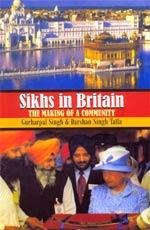
What we are about to suggest, to our knowledge has never been done before.
We are initiating the first TLH web-wide Sikh Book Club. At this point we are not sure of the frequency as we will gauge the interest from this first attempt.
What are we suggesting?
For the first book of our book club, we are suggesting a simultaneous reading of Gurharpal Singh and Darshan Singh Tatla’s Sikhs in Britain: The Making of a Community.
The two of us – Jodha and Mewa Singh – will facilitate the discussion (unless we can find someone better!). We plan to invite the authors as well as some prominent Sikh activists in our community. We hope Sikhs from all across the globe (especially UK Sikhs) will participate. Please feel free to invite others as well!
The Book:
Over the years we have read numerous academic books on the Sikhs and their history and the works of Gurharpal Singh and Darshan Singh Tatla have always been amongst our favorites. Thus, it was with great excitement that we see these two professors collaborating together. Both have an intimate knowledge of the Sikh community in England and we can think of few others that would be more able to write such a tome. This book, although focused on our brethren and sistren(?) in the UK, will provide us an avenue to delve into that section of our community, but we hope to broaden the conversation to understand other sections of our Sikh diaspora.
For the uninitiated Panthic Weekly is a Sikh portal that provides news and media on various issues that affect the Sikh community. As part of the Panthic Network, my first memories of the team are related to the long-standing Fort Panth Khalsa that especially became popular during the debates centered around the then-Jathedar Ranjit Singh.
The website over the years has developed a formidable presence on the website and is a celebrated by that section of our community that have a leaning towards the strong opinionated slant it represents, especially towards a specific Jathabandi.
For the most part, I applaud Panthic Weekly’s efforts and their abilities to engage with youth audiences with a variety of media. Their Khalsa.tv, Panthic.fm, Kathaa.net and Keertan.net are all efforts that deserve praise.
However, my problem with the network is their derogatory language and uncivil discussions that are promoted, often bordering on bullyism. Whenever, the editors of Panthic Weekly do not like a person, they change their name from ‘Singh’ to ‘Sinh’. Parkash Singh Badal becomes Parkash Sinh Badal; Former Jathedar Darshan Singh Ragi becomes Darshan Sinh Ragi; Prime Minister Manmohan Singh becomes Manmohan Sinh. Allegations of RAW agent, RSS-stooge, “traitor”, etc. and the worst parts of our post-1984 history are relived where Sikhs spew vitriole on other Sikhs.
As Belgian Sikhs celebrated the 300th anniversary of the Sri Guru Granth Sahib Ji, immigration police raided the Vilvoorde gurdwara, arresting 30 [link].
Police swooped on 19 suspected safe-houses in Brussels and surrounding suburbs during dawn raids on Saturday and discovered over 200 immigrants. The gangs ringleaders are said to be among 15 people arrested. Police also found 50 illegal immigrants hiding in a Sikh temple in Vilvoorde, a suburb north of Brussels. [link]
Officials say the raid was to break up an underground ring that was trafficking young, undocumented (Indian) Sikh men through Belgium to the U.K.:
The criminal gang, which charged Asian migrants over £15,000 for their journey from India via Moscow, is thought to have smuggled “thousands” of illegal immigrants in Britain over the last year and a half. [link]
Human trafficking notwithstanding, officials chose to coordinate their sting on the same day hundreds of Sikhs were holding Akhand Path for SGGS Ji’s tercentenary. From the accounts so far, police barged into the gurdwara, boots on, heads uncovered, and went through with their sting operation. By word of mouth, individuals said that even those who showed evidence of documentation were arrested for alleged trafficking.
If individuals in the community were trafficking under the conditions described, their actions are horrific. I am deeply troubled by the police decision to exploit a religious holiday, disrespect the religious observance of a minority, and then proceed to terrorize the congregation by “busting” traffickers and undocumented migrants. It reminds me of the abusive tactics I.C.E. has used in raiding homes and places of worship in Latino communities, preying on both the documented and undocumented. But what does this say for a country’s concepts of sanctuary and protection of minority communities? The gurdwara is always supposed to be a haven, a safe shelter, for anyone, including the indigent or oppressed. If it was used to further ill purposes, I don’t know what to say, but if it was used to protect undocumented migrants who were moving through the country as a matter of conscience, then what does this kind of militaristic and predatory behavior do to the relationship between the state and its people?
The Christian Science Monitor recently ran a story on how the Democratic Party is outpacing Republicans in polls among people of faith [Hat tip, Ennis]. The article emphasized how norms have changed between generations, and how values have realigned towards inclusivity among younger voters who identify with a faith community:
…young adults are more open to religious diversity and cooperation, they are less likely to say that one has to believe in God to be moral…
Young voters are much more inclined to support a larger government that provides more services (57 percent versus 45 percent of the overall population).
Young adults support government involvement most in regard to helping the poor and the environment.
Does this mean we’re seeing a shift against the “Culture Wars” of the Reagan-era? Voters across the board ranked wedge issues — including mariage equality and abortion — at the bottom of their political concerns. In the context of today’s uncertainty, it’s not surprising that people would be more concerned about health care and the economy. That said, I wonder if this shift away from “values” debates indicates a permanent trend for young voters.
While the survey’s analysis focused on divergences between Catholics and Evangelicals, a part of me wonders how much increasing religious diversity in the country has pushed against absolutist morality. Younger voters have shifted their prescription for the government’s role (or non-role) in regulating morality. These voters are also re-opening the door for how we define morality, whether multiple meanings can co-exist, and whether or not these meanings must be rooted in a faith identity or context.
It’s a traditional part of going to gurdwara — giving a dollar (or some other amount of money) as an offering before bowing down in front the Guru Granth Sahib.  Some may not think about this much, aside from how much they would like to offer and what they would like to think about before the Granth. For me, this practice is a bit more complicated. For years now, when I go to gurdwara, I consider not only the amount to offer, but the condition and source of the paper bill itself. Allow me explain:
Some may not think about this much, aside from how much they would like to offer and what they would like to think about before the Granth. For me, this practice is a bit more complicated. For years now, when I go to gurdwara, I consider not only the amount to offer, but the condition and source of the paper bill itself. Allow me explain:
When I go to, say a fast food “restaurant” or other business where cash is exchanged, I will look into my wallet and will feel a bit “bad” if the dollar bill I am handing over to vendor is crumpled, torn, held together by tape, or has excessive writing on it. For example, there is a $10 bill in my wallet now that has been there for weeks — I have been hesitant to subject a business to its possession. Some may view such reluctance as unnecessary.
But the situation changes dramatically, in my opinion, when we are talking about providing money to a gurdwara, as part of bowing down and expressing love and respect to our living Guru.
Recently on TLH we have had many posts around the 2008 Presidential Campaign. How these candidate make us feel and their policy positions are equally important when deciding, which candidate to support. The qualities and values he brings to the table for organizing support around what he thinks are critical issues is important for identifying which man will make the best key leader in America. We have listened to them debate, create campaign ads, and talk on campaign trails to their supporters. At the end of the day, I personally want to know how McCain and Obama will stand on issues important to me as a Sikh. The  economy, healthcare, foreign policy, and civil rights are important to all Americans regardless of ethnic or religious background; however, the nuances of how each ethnic/religious community is effected by these larger issues is important when their members vote for a Presidential Candidate. Many Sikhs may want to know:
economy, healthcare, foreign policy, and civil rights are important to all Americans regardless of ethnic or religious background; however, the nuances of how each ethnic/religious community is effected by these larger issues is important when their members vote for a Presidential Candidate. Many Sikhs may want to know:
“What is John McCain’s stance on racial profiling? How would an Obama administration address workplace religious discrimination?”
In an effort to answer some of these questions, the Sikh Coalition sent questionnaires to both McCain and Obama campaign offices many months ago. The intention was to have this information available when organizing Sikhs to vote at local Gurdwaras. However, only the Obama campaign responded. In an effort to provide bi-partisan information to the Sikh constituency, the Sikh Coalition is now petitioning McCain to respond, particularly when there are less than 30-days left until election-day. Sikhs deserve to hear his voice when making their decision at the ballot box. In addition, as a non-profit organization, the Sikh Coalition can not solely release Obama’s responses.
Okay, so I know that many of you would rather stick something sharp in your eye than have to watch Oprah. 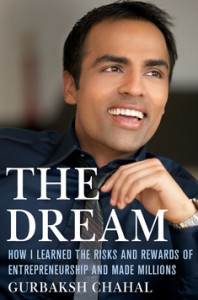 Stay away from sharp objects today then because the word is (thanks M) that Oprah will be interviewing self-made millionaire Gurbaksh “G” Chahal about his memoir The Dream being released later this month [side note: Oprah’s website clearly says her show today is about rudeness so I don’t know what the connection is?!]. For those of you who missed the news a few months ago, Gurbaksh (he actually goes by G because he says he doesn’t have the “easiest first name to pronounce”, but since we can actually pronounce it, we’ll use it) is the 26-year-old founder of ad network BlueLithium and, more recently, the ecommerce startup gWallet. Gurbaksh received much media attention when he sold BlueLithium to Yahoo last year for $300 million. From his website,
Stay away from sharp objects today then because the word is (thanks M) that Oprah will be interviewing self-made millionaire Gurbaksh “G” Chahal about his memoir The Dream being released later this month [side note: Oprah’s website clearly says her show today is about rudeness so I don’t know what the connection is?!]. For those of you who missed the news a few months ago, Gurbaksh (he actually goes by G because he says he doesn’t have the “easiest first name to pronounce”, but since we can actually pronounce it, we’ll use it) is the 26-year-old founder of ad network BlueLithium and, more recently, the ecommerce startup gWallet. Gurbaksh received much media attention when he sold BlueLithium to Yahoo last year for $300 million. From his website,
G was born in the town of Tarn Taran, near Amritsar in Punjab, India to Avtar and Arjinder Chahal. In 1985, his parents received a visa for America through a lottery-based system in India, and the following year, when he was four, the family settled in San Jose, California. His parents had arrived with only $25 to their name, and they struggled at menial jobs to make a future for their four children. For the Chahal family, as for many immigrants, education was paramount, but G left high school at sixteen to form Click Agents, an Internet advertising company, which he sold two years later for $40 million.
Sundari’s recent post, addressing the portayal of Sikhs in an ad for the upcoming Spinning Wheel festival, brings up an interesting tension for Sikh women- the conflict between modern ideals of beauty, and the requirements of the Sikh faith.
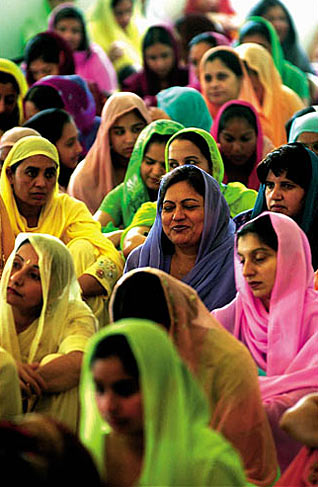 Generally (and unfortunately) women tend to value themselves (whether consciously or unconsciously) according to social valuations placed upon women… which revolve mostly around ideas of outer beauty- trends which vary a bit across region and time, but are all generally superficial. Women who have completely overcome this unconscious embrace of ideals of beauty are extremely rare. For those who think is untrue- think about how many times you’ve heard a female friend talk about the bad day she was having- many of the complaints probably had something to do with the way she felt she looked that day (that might not be the best example, but it’s the first that comes to mind). How we feel is too closely related to how we feel we look.
Generally (and unfortunately) women tend to value themselves (whether consciously or unconsciously) according to social valuations placed upon women… which revolve mostly around ideas of outer beauty- trends which vary a bit across region and time, but are all generally superficial. Women who have completely overcome this unconscious embrace of ideals of beauty are extremely rare. For those who think is untrue- think about how many times you’ve heard a female friend talk about the bad day she was having- many of the complaints probably had something to do with the way she felt she looked that day (that might not be the best example, but it’s the first that comes to mind). How we feel is too closely related to how we feel we look.
These social valuations of beauty are especially problematic for Sikh women in particular because these values are totally opposed to an important part of Sikh identity- our kesh. They are also problematic for all women because we’re not valuing what really matters- our thoughts, ideas and actions which really create who we are- but a superficial farce. Finally, these valuations are problematic because many modern ideals of beauty are unhealthy (but enough has been said about these last two points in general gender conversations that I don’t want to dwell on them).
The challenges and overt racism that Sikh men face in the US today because of their kesh are undeniable. But the solutions that address men’s kesh (mostly political responses, creating social awareness) don’t carry over as solutions for women.
Only every so often I come across a petition in my inbox which advocates for an issue that I feel strongly about. I find myself more than happy to take the few minutes required to click on the links and add my name to the “Undersigned.” 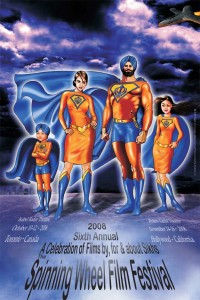 A few days ago, I was sent another such petition, but to be quite honest I didn’t quite know what to make of it.
A few days ago, I was sent another such petition, but to be quite honest I didn’t quite know what to make of it.
The petition, drafted in response to an advertisement for the upcoming Spinning Wheel Film Festivals, states that the “superhero” image being used depicts Sikhs in a negative manner. The author(s) suggest that the characters shown in the poster are portrayed in ways that go against the Sikh Rehat Maryada and Gursikh principles.
The current poster diminishes Sikh identity by playing fast and loose with Sikh Rehat Maryada in presenting the lead male and female characters as superheroes and role models. They appear more as villains, abandoning the true Sikh virtues. Going about “saving the world” with the hair uncovered is far from being obedient to Sikh Rehat and to the visible identification as a Gursikh. The Kirpan is supposed to be worn in a Gatra, not attached to a belt. Furthermore, pierced ears as in the case of the young girl are not in the spirit of how Sikhs should raise their children towards principled Sikh living.
I have my own opinions about the SWFF as it stands today, and although I was somewhat surprised by the choice of promotional material being used (from an aesthetic perspective) – I was much more intrigued about the nature and origin of the petition. I don’t know who authored the petition (does it matter?), but it brings up a much larger issue. The petition goes beyond a simple commentary of promotional material. The various comments left on the petition (even the incoherent ones) suggest that many individuals within our community still believe that Sikhs are only defined by certain external attributes:
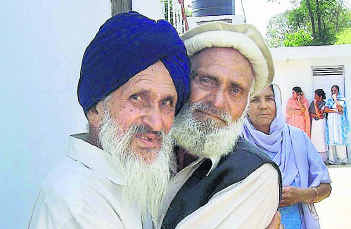 I had been sort of taking a wait-and-see approach to this news (pagh salute: preet) arriving out of England. It seems some punk kids started a blog to stir religio-ethnic hatred amongst Sikhs and Muslims. My hesitation was that I did not want to further enflame the story and further create the sort of reaction that the website had hoped.
I had been sort of taking a wait-and-see approach to this news (pagh salute: preet) arriving out of England. It seems some punk kids started a blog to stir religio-ethnic hatred amongst Sikhs and Muslims. My hesitation was that I did not want to further enflame the story and further create the sort of reaction that the website had hoped.
The blog of Jerome Taylor of the Independent had first written about the website and its intentions:
The website contains pictures of at least 25 Sikh women which the site’s administrators claim to have seduced alongside highly provocative remarks about the women and the Sikh religion.
Timed to coincide with the start of the university year – described in the site as a time when “[Muslim] soldiers go hunting for Sikh slappers” – the website’s creators encourage friends and readers to send in pictures of Sikh women they have seduced during freshers week.
The most vile part of the website was that it posted pictures of young women (that it claimed came from Sikh backgrounds) and wrote in the most nauseating way that males often talk. I did see the website and it was disturbing.

“I don’t trust Obama. I have read about him and he’s an Arab.”
So said a McCain supporter at a recent rally. To such an ignorant, bigoted, racist comment, McCain could only reply:
“No, ma’am,” he said. “He’s a decent, family man, a citizen that I just happen to have disagreements with.”
McCain did not say that Arabs are decent people, instead we are left to infer that “Arabs” and “decent, family man” are somehow antonyms. Barack Obama should not be let off the hook either as he is just as complicit. Earlier when his Democrat primary opponents were trying to smear him, he distanced himself from being Arab and Muslim (which of course he is not!), but did not stop that conversation and say Arabs and Muslims are just as American as anyone else.
The current economic meltdown has made me reflect more and more on the role of community organizations/institutions during times of hardship and uncertainty. Our current economy is in bad shape, and we’re likely to feel the fallout in lost jobs, lost job openings, and lost homes/assets for months, possibly years, to come.
during times of hardship and uncertainty. Our current economy is in bad shape, and we’re likely to feel the fallout in lost jobs, lost job openings, and lost homes/assets for months, possibly years, to come.
What are our responsibilities to one another in times of crisis? The response is reliable and familiar for disasters, but with something as pervasive and private as personal finances and wealth, it becomes trickier. I have watched families fall through class brackets and learn to reevaluate their class identities and sense of pride in the context of previous recessions, but this recession seems like a harbinger of a deeper struggle to come.
Sikhi has a relatively clear requirement for service to others and wealth redistribution (daswand) from the more to less fortunate. What do we do when we find ourselves moving across classes or relative wealth? I would argue that now, more than ever, as people of faith our philanthropy, service, and efforts are needed in the same ways they would be for a disaster or catastrophe. We have an opportunity and moment to move beyond our personal egos and create support systems not only for the Sikh community, but for our larger communities. How many of our gurdwaras are located in areas that are impacted by the current mortgage foreclosure crisis and recession? Enough that I think we can make a difference.
I hope that in this stressful time we can rise to the occasion and get to know our neighbors by sharing and providing shelter, comfort, food, and resources. These dire times truly call for chardi kala and sarbat da bhalla, but we will be challenged to figure out what that means and how to make that happen in a time when all of us face uncertainty as individuals and community members.
In keeping with the recent Election 2008 theme on TLH, I ask you the following — which party do you think completes this sentence:
[x] believe that individuals should contribute time and resources to serving the poor, vulnerable, and less fortunate members of our society.
Do you think x refers to:
- Democrats; and/or
- Republicans.
So this past Saturday, Tina Fey, did a great job impersonating Sarah Palin’s “performance” at the Vice Presidential Debate on SNL. The body language, voice, and choice of words were right on and HILARIOUS!
Yesterday, Robin Abcarian, of the Los Angeles Times, wrote about the debate of body languages between Obama and McCain during this week’s Presidential Debate.
Abcarian wrote:
Obama sat like a jazz musician on his chair, one heel hooked at an angle, while McCain sat as if he might leap up at any moment, or stood impatiently waiting for his turn to speak.
Glass, a body language expert said that McCain was, “… like the Energizer Bunny [who] had some batteries put in. “We have never seen McCain so warm and fuzzy and likable and dynamic.”
This same expert thought that, “… Obama seemed unnatural at times. “Somebody coached him and did not do him a favor,” she said. “When he talks about an issue he’s passionate about, his gestures are fluid and real, but other times, he took his index finger and clasped it to his thumb, and it’s phony, it’s not real.”
However, at the end of the debate, body language experts declared Obama as the winner because “… a debate is won in the first 15 minutes and lost in the last two … Obama closed on a higher note than McCain.”
For our readers, who watched the Presidential Debate, what body language or mannerisms did you notice that would be great for another Saturday Night spoof?
From the Volokh Conspiracy:
Dear Senator McCain:
Repeatedly calling me and everyone else in the United States “my friends” is extremely annoying. In part, it’s just an irritating phrase. Beyond that, I’m not your friend. I don’t know you, and, from what I know of you, I don’t even really like you. Sorry to focus on such superficialities when the world economy is going to Hell, but you probably lost more votes with your constant repitition of “my friends” than from anything Obama said.
Sincerely,
David B. [link]
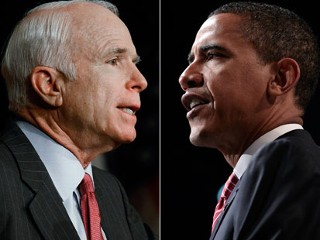 Reema (I’m signing on.)
Reema (I’m signing on.)
Both candidates used the phrase. And of course, because of my bias, it grated on my nerves when McCain used it. It was just amusing when Obama did. Anyone who is about to control my life and the lives of all US residents is not a friend, and they shouldn’t try to be. They just better know what they’re doing because everything (economy, environment- one in 4 mammals is threatened with extinction, social security, Medicare + Medicaid) seems to be falling apart at the same time. Not to be dramatic or anything. The only suggested economic solution from a Sikh point of view I found was vague, overly ambitious, and not really very palatable either.
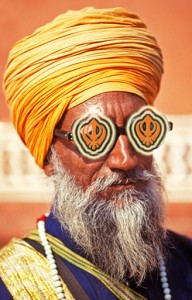 Has anyone else noticed how ridiculous the (US Presidential Election) campaigns have gotten? The ridiculousness has reached a new all time low in the past few weeks with both sides slinging mud, making tenuous connections, and outright lying. Admittedly, I have a preference for one side over the other, but like most people nowadays that means less than it used to and I have truly tried to be “fair” in my analysis of recent politicking. What I have seen from both sides makes me gag.
Has anyone else noticed how ridiculous the (US Presidential Election) campaigns have gotten? The ridiculousness has reached a new all time low in the past few weeks with both sides slinging mud, making tenuous connections, and outright lying. Admittedly, I have a preference for one side over the other, but like most people nowadays that means less than it used to and I have truly tried to be “fair” in my analysis of recent politicking. What I have seen from both sides makes me gag.
It seems to me that the strategies on both sides of the isle amount to this: avoid answering any questions; lie/stretch the truth whenever you feel you can get away with it (or even when you know you can’t), and don’t forget to act arrogant. If you doubt my generalization, I implore you to go to johnmccain.com or barackobama.com and look at the ads for yourself, watch the debates, or just snippets on youtube. What’s even worse is that the media has come to expect this childishness. Some of you may be thinking “So what?! – this is politics.” It is my hope that most of you don’t feel that way and just accept this behavior as the status quo.
I think what gets to me about this whole election cycle is how fundamentally un-Sikh-like the behavior has been. Let me explain. As a Sikh – I like to look at things through my Sikh glasses and when something is fuzzy or just doesn’t make sense, it is time to analyze why. Growing up as a Sikh and trying to live a gursikh life now, I have come to think of certain things – stand up for what you believe in, speak the truth – as almost requirements for being a good person. Gurbani provides numerous references to such virtues and while I am sure they are no different from many other religions, I think they are much more pronounced in the Sikh faith. Integrity, honesty, and courage are central to Sikhi. So from this perspective I evaluate recent campaign tactics.
Ultimately, my point is that the campaigns aren’t making their cases very well to someone like me, who is wearing gold rimmed, khanda shaped, Sikh glasses. Ideally, I’d like a President who I can feel good about, someone I see as a role model, and right now the choices leave much to be desired…
—
By the way, despite the above I feel one of the candidates is at least trying to steer clear of the muck and focus on the issues…so I give props to OBAMA for that. Go OBAMA!
Last week Bill Maher was a guest on the Daily Show, promoting his new movie Religulous and offering a clip. The clip happened to show a sardar in a London park, which was the extent of any Sikh’s appearance in the movie.
The name, ‘Religulous,’ is a portmanteau blending the words 1) religion and 2) ridiculous, and examines the overlap of those concepts. The movie’s proclaimed purpose is to promote doubt in the minds of those who have blocked doubt in religious teachings completely and subsequently hold totally irrational beliefs (i.e. reject evolution), though those who actually go to watch the movie probably wouldn’t be completely opposed to such doubt to be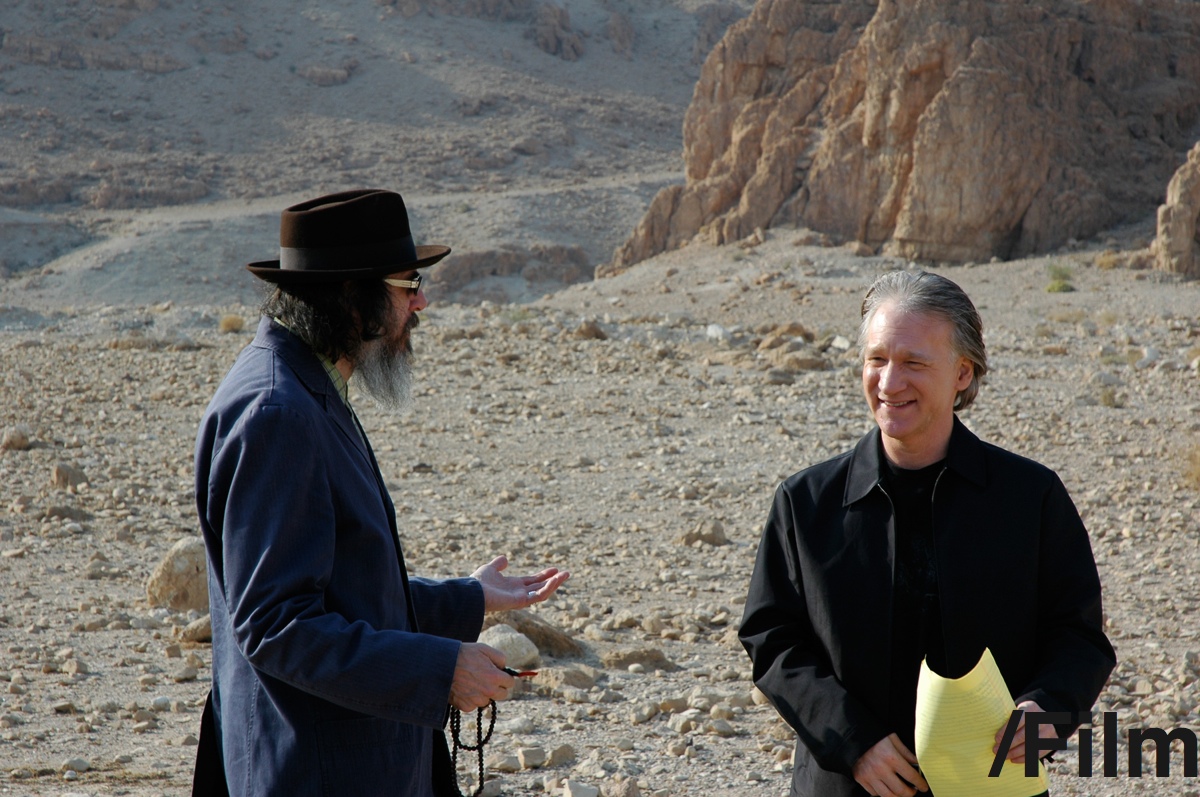 gin with. Of course at some point the explanations of rationality end, and there is the unknown. The point of the movie is to admit that it actually is unknown, and show that those who claim to know, really don’t.
gin with. Of course at some point the explanations of rationality end, and there is the unknown. The point of the movie is to admit that it actually is unknown, and show that those who claim to know, really don’t.
In the movie, Bill Maher interviews people from a variety of backgrounds and religious faiths (from a former head of the Human Genome Project and the former Director of the Vatican observatory to a British rapper). Some hold more nuanced views than others. He listens and asks questions of people who staunchly believe in literal translations of age old texts even when their beliefs scientifically absurd, and has some interesting (and comical) conversations. My favorite interview by far was with a very rational Vatican priest who happily admitted that Jesus’ birthday is not on December 25th and the Catholic church has absolutely no idea when it really is.
Time magazine recently named Balbir Singh Seechewal amongst its “Heroes of the Environment 2008.” The acknowledgement highlights the work of activists such as Balbir Singh and shows how their passion and innovation can positively impact the environment. Balbir Singh is described as “the Sikh who cleans the corrupted rivers of India,” and he is accoladed for his work of cleaning the historic Kali Bein river. The 99-mile-long river, in the Hoshiarpur district, is considered historically significant because Guru Nanak Dev Ji was said to have received enlightenment after taking a dip in the Kali Bein river. However, due to years of neglect, the river has become a containment of waste,
Over the past couple of decades it was reduced to a filthy drain into which six towns and more than 40 villages emptied their waste. Parts of the river dried up, leaving neighboring farmlands parched. Its polluted waters also seeped underground, contaminating the groundwater and causing lethal diseases.
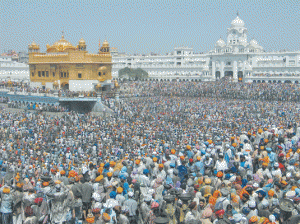 In 2000, Balbir Singh and inspired volunteers decided to use the concept of kar seva (voluntary service) to physically clear the entire riverbed and build riverbanks and roads alongside the river. In addition, they educated the locals via a public-awareness campaign on how to keep the river clear of waste. Today the river is not only cleared of sewage, but the natural springs have been revived and the river is once again flowing.
In 2000, Balbir Singh and inspired volunteers decided to use the concept of kar seva (voluntary service) to physically clear the entire riverbed and build riverbanks and roads alongside the river. In addition, they educated the locals via a public-awareness campaign on how to keep the river clear of waste. Today the river is not only cleared of sewage, but the natural springs have been revived and the river is once again flowing.
As we join others in praising Balbir Singh and his volunteers for what they have accomplished with the Kali Bein river, I also want to highlight the concept of Kar Seva and take the liberty to ask if we do enough of it? The most famous examples of Kar Seva occurred at the Darbar Sahib in Amritsar. I have seen pictures and videos of the last Kar Seva which occurred in Amritsar – and I have to admit, I don’t think words can describe the power of those images.
We seem to be pre-occupied with building new gurdwaras (yes, I know – that’s a whole other issue), but i mention it to simply say that as a community, we don’t do a very good job at sustaining our current establishments. Whether we speak of our historic gurdwaras in Punjab (both East and West Punjab) or if we think about our gurdwaras here in North America – there is a lot of Kar Seva which can be done. After seeing the images of Kar Seva at the Darbar Sahib, it is amazing to me how our community can mobilize itself to such an extent and peform such an incredible act. And yet, in many communities and at many gurdwaras, we struggle with keeping the kitchen clean or the trash picked up. Can Kar Seva exist outside of Punjab? It just makes you wonder….
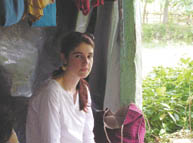 In an article published in the academic journal Ethnic and Racial Studies, last year, a PhD student in political science, Marie-Eve Reny makes a comparative study of political mobilization amongst the Sikhs of Punjab and the Uyghurs of Xinjiang in China.
In an article published in the academic journal Ethnic and Racial Studies, last year, a PhD student in political science, Marie-Eve Reny makes a comparative study of political mobilization amongst the Sikhs of Punjab and the Uyghurs of Xinjiang in China.
The Uyghurs are a Muslim community of Turkic descent in Western China. Many in the region have been fighting for their independence from China to establish Uyghurstan.
For her abstract, Marie-Eve Reny writes:
This article examines the reasons why the politicization of language has not been translated into disruptive forms of ethnic mobilization as opposed to the political salience of religion among the Uyghurs in Xinjiang throughout the 1990s and the Sikhs before and after the creation of Punjab in 1966. The article argues, from a structural-rationalist perspective, that language-based claims in Xinjiang and in Punjab have been accommodated by the respective central governments to a larger extent than religious claims have. Accommodation has taken the form of particular policies as well as greater incorporation of minority elites on the basis of language, which have in turn significantly reduced the possibilities of anti-regime sentiments and the incentives for disruptive forms of pressure on the basis of linguistic claims among the minority group. Religious claims have, however, not been accommodated in a similar way.
